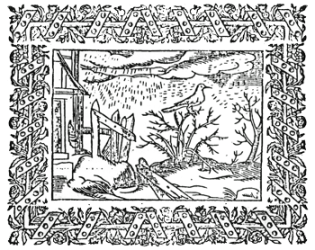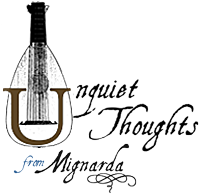Saturday morning quotes 3.11: What Dowland said
 “Euery Plant brings forth his like, and of Musitians, Musike is the fruit.”
“Euery Plant brings forth his like, and of Musitians, Musike is the fruit.”
So begins the dedication in Andreas Ornithoparcus His Micrologus or Introduction: containing The Art of Singing. Digested into foure bookes. Not onely profitable, but also necessary for all that are studious of musicke. (1609).
The book was John Dowland’s thorough translation of Andreas (Ornithoparcus) Vogelsang’s Musicae active micrologus (1515), and since Dowland recast every word of the original Latin book into English, we can easily assume that his laborious translation was tempered by and tinged with his own interpretive opinions, offering us a wealth of insight into the lutenist-composer’s personality.
The dedication to Robert Cecil, 1st Earl of Salisbury (1563 – 1612) contains the usual deferential chit-chat but it’s worth remembering that Cecil was the son of Elizabethan spymaster Burghley, and he was also the recipient of Dowland’s ‘panic letter’ penned from the Continent in 1595. Dowland wisely mentions a famous Protestant when referring to past pronouncements on the power of music:
…the Exercise of Musicke, which mind-tempering Art, the graue Luther was not affraid to place in the next seat to Diuinity.
Dowland’s introductory discourse likewise gives us a glimpse into his own reasons for producing the translation of what he clearly considered to be an important work:
Excellent men haue at all time in all Arts deliuered to Posteritie their obseruations, thereby bringing Arts to a certainty and perfection….There is nothing can more aduance the apprehension of Musicke, than the reading of such Writers as haue both skilfully and diligently set downe the precepts thereof.
And of course he makes mention of his plans to publish his own instructions on playing the lute:
[The] Instrument as of all that are portable, is, and euer hath been most in request, so is the hardest to mannage with cunning and order…
Dowland’s translation of Ornithoparcus’ text outlines and describes the categories of music:
[Of the Musicke of the World.]…How can this quick-mouing frame of the world whirle about with a dumb and silent motion? From this turning of the heauen, there cannot be remoued a certaine order of Harmonie. And nature will (saith that prince of Romane eloquence Cicero, in his sixt booke de Reipub.) that extremities must needs sound deepe on the one side, & sharp on the other. So then, the worlds Musicke is an Harmonie, caused by the motion of the starres, and violence of the Spheares.
…
[Of Humane Musicke.] Hvmane Musicke, is the Concordance of diuers elements in one compound, by which the spirituall nature is ioyned with the body, and the reasonable part is coupled in concord with the vnreasonable, which proceedes from the vniting of the body and the soule.
…
[Of Instrumentall Musicke.] Instrumentall Musicke, is an Harmony which is made by the helpe of Instruments.
After a discussion of instrumental music, Dowland outlines music as broken down into several subcategories including Harmonicall, Organicall, Inspective, Actiue, Mensurall, and Plaine Musicke. We seem to draw closer to Dowland’s own opinions when he outlines the differences between a musician and a singer:
Who is truely to be called a Musitian.
Therefore he is truely to be called a Musitian, who hath the faculty of speculation and reason, not he that hath only a practick fashion of singing: for so saith Boetius lib. 1. cap. 35. He is called a Musitian, which taketh vpon him the knowledge of Singing by weighing it with reason, not with the seruile exercise of practise, but the commanding power of speculation and wanteth neither speculation nor practice.
In the section Who be called Singers, Dowland distinguishes between Cantors and Practitians, and he quotes a verse attributed to Guido d’Arezzo (c. 992 – 1033)
Musicorum et cantorum, magna est distantia.
Isti dicunt, illi sciunt, quae componit Musica,
Nam qui facit, quod non sapit, diffinitur bestia.
Verum si tonantis vocis laudent acumina,
Superabit Philomela, vel vocatis Asina.
(Dowland’s spellings of the Latin verse are given an updated reading for clarity.) The verse can be translated as follows: “There is a vast difference between musicians and singers. The latter merely perform, whereas the former understand what makes music. For he who performs what he does not understand is a mere brute. But in truth if the thundering voice of praise The Nightingale surpasses in deed the calling of the ass.”
The verse as ‘Englished’ by Dowland is rhymed, if lumpy, and given a unique interpretive slant.
Twixt Musitians, and Practitian, oddes is great:
They doe know, these but show, what Art doth treat.
Who doeth ought, yet knoweth nought, is brute by kind:
If voices shrill, voide of skill, may honour finde?
Then Philomel, must beare the bell,
And Balaams Asse, Musitian was.
We close with Dowland’s justification as to why the study of music is worthwhile.
Of the Profitablenese of this Art.
The Profit of this Art is so great, (as writeth Pope Iohn the 22 of that name, in the second Chapter of his Musick) that whosoeuer giues himselfe to it, shall iudge of the qualitie of any Song, whether it be triuiall, or curious, or false: He knowes both how to correct that which is faulty, and how to compose a new one. It is therefore (saith he) no small praise, no little profit, no such labour as to be esteemed of slightly, which makes the Artist both a Iudge of those Songs which be composed, and a Corrector of those which be false, and and Inuentor of new.
If we are truly interested in delving into Dowland’s music in a thoughtful and understanding manner, it is necessary to peruse the world the man inhabited. Dowland would have expected nothing less.
